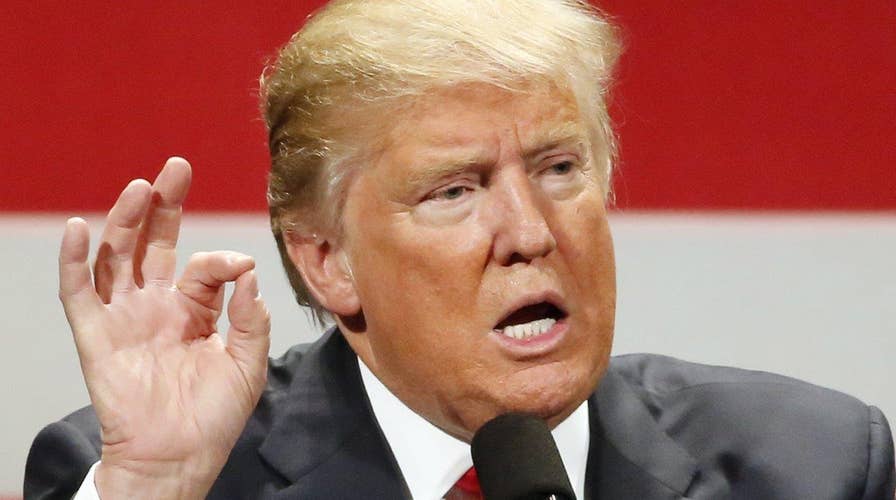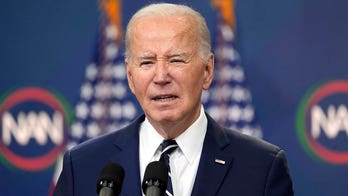How Trump would get Mexico to pay for the border wall
GOP candidate's plan to use economic force explained on 'America's Newsroom'
Donald Trump’s campaign at last revealed how the Republican presidential candidate plans to pay for a U.S.-Mexico border wall, saying he would threaten to cut off billions of dollars that immigrants in the U.S. send south of the border unless Mexico’s government funds the wall.
The plan, outlined in a two-page memo to The Washington Post , was quickly ridiculed by President Obama.
"Good luck with that," Obama said at a press briefing Tuesday.
The plan indeed raises complicated legal questions, but marks the first clear proposal by Trump for financing the ambitious border wall project that has become a cornerstone of his presidential campaign – and a punching bag for his political foes.
Trump said in his memo, titled "Compelling Mexico to Pay for the Wall,” that he would cut off a portion of the cash sent to Mexico through money transfers – also called remittances – under the USA Patriot Act antiterrorism law. He would remove the hold if Mexico made “a one-time payment of $5-10 billion” which would be used to pay for his wall.
“It’s an easy decision for Mexico,” Trump said in the memo, adding that the majority of the nearly $25 billion sent to Mexico in remittances in 2015 comes from undocumented immigrants.
Obama, speaking to reporters, warned of the ramifications such a plan would have on the Mexican economy which, in turn, could drive more immigrants to cross the border in search of jobs.
"People around the world ... don't expect half-baked notions coming out of the White House. We can't afford that,” he said.
Experts say such a move would damage the economy in many parts of Mexico, but the poorer and more rural areas – the home bases of many drug cartels – would be particularly hard hit. Without the money sent from relatives and friends living in the U.S., residents of states like Michoacán and Guerrero would be forced to look at other avenues for income. One of the biggest beneficiaries of the move could be narco-traffickers.
“One of the potential risks of cutting off remittances is you drive more people into the illicit economy,” Eric Olsen, the associate director of the Latin American program at the Wilson Center in Washington, D.C., told Fox News Latino. “All the major remittance-sending [U.S.] states also have problems with organized crime.”
Experts also questioned the legality of regulating money transfers and if Trump would have the political capital to push his proposal through Congress.
“Trump is giving an extremely broad definition of this section of the Patriot Act and what it allows, and it’d surely be litigated,” Stuart Anderson, executive director of the National Foundation for American Policy, told the Washington Post . “It would be a large expansion beyond what the text reads.”
His memo fails to mention how he would force financial institutions and money wire services from preventing those funds from being sent to Mexico. It is also vague as to how commercial transactions across the border might be affected as well as how the federal government would deal with financial transactions that take place over the Internet.
“The president of the United States can’t just tell banks and Western Union to stop sending money to Mexico,” Olsen said. “We have a presidency, not royalty.”
Besides remittances, Trump’s proposal also mentions “increasing fees on temporary visas issued to Mexican CEOs and diplomats" – revoking them, if necessary – as well as hiking fees on port fees, border-crossing cards and NAFTA worker visas from Mexico.
“Our approvals of hundreds of thousands of visas every year is one of our greatest leverage points,” Trump wrote. “We also have leverage through business and tourist visas for important people in the Mexican economy.”
Some experts say these measures would not only hurt Mexicans but also Americans. Mexico is the third-largest trade partner of the U.S. behind Canada and China. Total trade between the two nations is estimated be more than $506 billion a year, according to Census Bureau data, and many states have Mexico as their principal trading partner.
“You’re heading down the path to a trade war, and the U.S. has as much to lose as Mexico does,” Olsen said. “It’s not thinking two or three steps down the path.”
Mexico's President Enrique Peña Nieto has said his country will not pay for a wall. In an interview with the Excelsior newspaper last month, Peña Nieto compared Trump's rhetoric to that of dictators Adolf Hitler and Benito Mussolini, saying that language like his has led to "very fateful scenes in the history of humanity."
Despite the criticism, Trump argued that building the wall between the U.S. and Mexico is a moral imperative given the amount of drugs and undocumented immigrants coming north.
"We have the moral high ground here, and all the leverage," Trump wrote in the memo. "It is time we use it in order to Make America Great Again."
The Associated Press contributed to this report.





